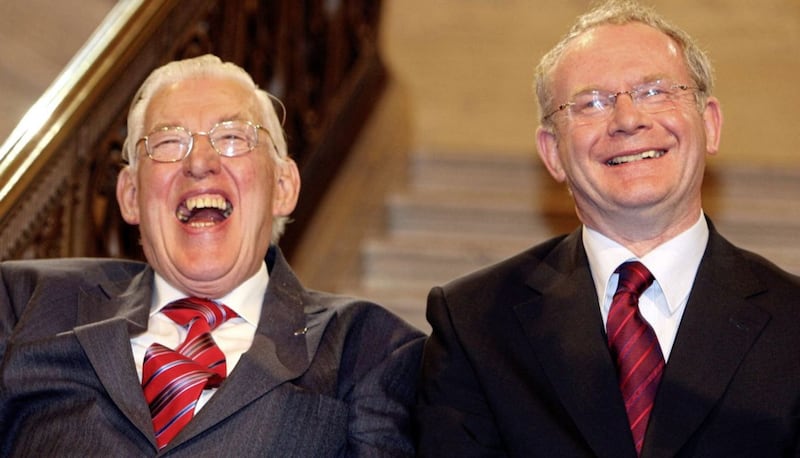In an article on July 6 1998, about a week after the election to the first assembly, I wondered what anti-agreement unionism would choose to do.
The DUP had campaigned on the basis that the Good Friday Agreement was a one-way ticket to a united Ireland and that it should be destroyed in all of its manifestations.
Robert McCartney’s UKUP was just as hostile, as were the three independent unionist MLAs who grouped together as the UUC.
Between them they totalled 28 MLAs, the same number as had been elected by the UUP.
What provided David Trimble with his majority was the support of the two PUP MLAs, David Ervine and Billy Hutchinson.
But Trimble had another problem. At least five of his MLAs were, at best, ambiguous on the GFA — and two of those five veered towards open hostility.
Key players of the UUP, including most of the parliamentary party and a handful of officers, were also anti-agreement; some of them had even shared platforms with the DUP and UKUP during the referendum campaign a few weeks earlier.
What was clear was that the assembly would not have survived – or even got off the ground – had the anti-agreement elements in the DUP, UKUP, UUC and UUP decided to boycott it.
Trimble would not have survived, because he would have found himself in a position similar to that of Brian Faulkner from December 1973 to May 1974.
My instinct was that, for all the noise it made on and off camera, the DUP would not deploy the wrecking ball.
The risks were too great, not least that the British and Irish governments, having got the republican and loyalist paramilitaries onside, were very unlikely to head back to the drawing board.

So, it wasn’t a huge surprise when the DUP began edging towards what became the ‘better deal, fair deal’ strategy.
UKUP and UUC also remained in situ, not trusting the DUP to be the sole representatives of anti-agreement unionism.
At that point, in July 1998, there was, I reckoned, no place for the DUP to be other than inside the assembly structures.
It had taken almost 25 years to restore devolution after Sunningdale and the party wasn’t prepared to hold on for another couple of decades in the hope of something better.
Anyway, I think Paisley and Peter Robinson quite liked the prospect of growing UUP internal tensions turning into a full-scale civil war.
In May 2007 – having nudged comfortably ahead of the UUP and seen off any real challenge from the UKUP and UUC – the DUP found itself in another make-or-break moment: whether or not to seal the deal on a power-sharing arrangement with Sinn Féin.
It had seen what had happened to Trimble and the UUP for merely accepting Sinn Féin in the executive and now it was proposing Martin McGuinness as deputy first minister.

It was a huge risk – one which led directly to the creation of the TUV – but a risk which had to be taken, because the party hadn’t been able to deliver what I always referred to as the ‘viable and available alternative’.
The DUP – along with the UUP this time – faces another one of those moments.
It brought down the assembly again in February 2022, insisting there would be no restoration until the ‘Protocol problem’ had been resolved to the party’s satisfaction.
That was never happening and the overwhelming parliamentary support for the Windsor Framework was confirmation that it wouldn’t happen.
So, like 1998 and 2007 (and let’s not forget the below-the-radar discussions between the DUP and Sinn Féin in the run-up to May 2007), the DUP had to find a way of reversing with as much dignity as possible.
The Safeguarding The Union Command Paper, published on January 31 this year, was enough to get the DUP over the line.

Mind you, I wrote here and elsewhere that this paper was all structure and no cement, adding, in my notes in the margin, “it reads like the government has only just realised that NI is actually meant to be an integral part of the UK”.
Yet it was all the government needed to offer, because it knew the DUP couldn’t risk collapsing the assembly once and for all and, in doing so, hand the strategic agenda to the TUV and others.
The hoopla over the assembly vote on the Framework was meaningless too.
The DUP and UUP have no alternative to devolution, and they certainly don’t want direct rule or hybrid joint authority.
So, for all the anger in unionist/loyalist circles over the Protocol/Framework, the structures won’t be collapsed on that basis.
Crucially, let’s not forget that the elements of unionism/loyalism who do favour collapse have yet to produce their own viable and available alternative.




